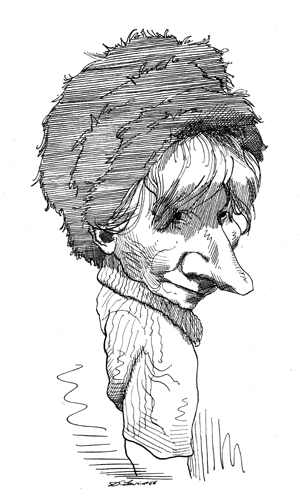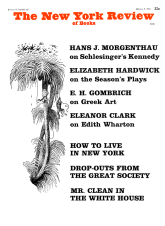The biographies and autobiographies are on the whole more impressive than the fiction of the last two decades, but the freakish best sellers among them are least likely to withstand the test of time. Violette Leduc’s autobiography, La Bâtarde, has sold no less than 125,000 copies and one wonders if this could happen outside France. The English translation contains 488 breathless pages of staccato prose occasionally posing as poetry. One pities the conscientious translator and hopes that he is enjoying a well-deserved rest cure after so arduous a task. But why did he not translate the title of the book? Did the prospect of respectable housewives inquiring for The Bastard at their local library deter him? (“Excuse me, ma’m, what did you say?” “I said Bastard,” sotto voce. “Are you calling me names?”)
The publisher’s blurb and Simone de Beauvoir’s Introduction are calculated to whet the appetite of a certain type of reader. “Violette Leduc does not try to please,” says the doyenne of Existentialist dames, “she doesn’t please; in fact she alarms people.” Diaghilev once begged Cocteau to astonish him. Times have changed since then: most of us have become immune to mere astonishment. Apparently the 125,000 readers of La Bâtarde were eager to be alarmed by different stuff from Ian Fleming’s Surfeited with James Bond and his streamlined vamps, they turned to a middle-aged Frenchwoman who, to quote her promoter again, “weeps, exults, and trembles with her ovaries” in accordance with the prevalent literary current.
The insistence on ovaries throughout this tome is a leitmotiv which eventually gets on one’s nerves to such an extent that one sympathizes wholeheartedly with her friend Maurice Sachs when he explodes: “Your unhappy childhood is beginning to bore me to distraction. This afternoon you will take your basket, a pen, and an exercise book, and you will go and sit under an apple tree. Then you will write down all the things you tell me.”
Maurice Sachs was a wily one, as we learn from his autobiography, and he knew how to cope with bores. The immodest Violet confesses that she had a crush on him though he made no secret of the fact that he preferred his own sex. “Annoyed at my own tantrums, annoyed at the way he put up with them, I lay bleeding. We ate dinner together in my room. I didn’t desire Maurice. I desired the hell of our life together.” Luckily for her, she took his literary advice. Her commercial success and the eulogies of the leading Existentialists have justified it amply. The author of Nausea had blown a trumpet blast in honor of Jean Genet; Mme. de Beauvoir, not to be outdone, proceeded to blow a whistle in honor of Violette Leduc, whose previous efforts, L’Asphyxie, L’Affamée, Ravages (what bracing titles!), had passed unnoticed by the general public. But the difference between the protégés of M. Sartre and his feminine colleague is considerable: while the glamor of Genet’s literary style at his best is undeniable, Violette Leduc exhausts her ovaries and us with pretentious mawkishness and platitude. “The peasant is the servant of the soil. He tends it. He gives it water when it’s dry, he is making its bed when he plows the fields, he strokes it and soothes it by rolling it, he is already mingled with it even before he dies because he gives it back his dung.” Where have we heard this sort of annotation before? Let us rather peer at Millet’s Angelus. Mme. de Beauvoir draws our attention to such gems as: “Don’t murder that warmth at the top of a tree. Things talk without your help, remember that; your voice will muffle them…. The rosebush bows under the ecstasy of its roses: what is it you want to make it say?” And for sheer bathos: “Don’t leave me, dear little bulb. You’re so chubby, I’m going out with a cheek in the hollow of my hand, a shiny cheek that I am keeping warm.” No doubt these sound sweeter in French than they do in English.
Like her promoters Violette Leduc is devoid of humor, though she has a plethoric temperament of a kind that is best kept under strict control. Personally, I should prescribe for her a prolonged course of Jane Austen, to whose Pride and Prejudice I returned for relief. “I always write about myself—me,” Violette remarked complacently. Her range is narrow in consequence though her emotional sympathy with her subject is intense. If all that she tells us is true of her covetous greed and her torturing of those who loved her—not to mention her pilfering and other peccadilloes—one is hardly surprised that she suffered from loneliness. Most of us would run hell for leather from so predatory a female.
Advertisement
Granted, it was a disadvantage to have been born out of wedlock without any physical compensation, but how many other poor girls have overcome similar drawbacks! In spite of them she inspired fierce and enduring passions in several women and she married a man who must have cared for her originally. One after another she deliberately shattered these relationships by her despotic possessiveness. If she is “a praying mantis devouring herself,” she chews herself narcissistically in a hall of mirrors. The episode where she persuades her reluctant girl-friend and victim Hermine to perform erotic exercises with her for the delectation of a jaded old voyeur is depressingly characteristic. She has the knack of making her reader feel like a spectator of blue films, watching scene after scene for which there is no aesthetic justification. You need not be a Puritan to be sickened by her ponderous pedaling of squalor and her orgies of howling self-pity. Admirers of Courbet’s picture of the slumbering Lesbians might enjoy her account of her amorous transports with her schoolmate Isabelle. Here she relives the excitements of sensual discovery and exults in them for a change, forgetting “the grudge she bears the world.” But her contribution to the literature of Lesbos pales beside that of the moral champions of homosexuality, for without a sense of good and evil everything becomes pallid and flat.
For her the German occupation of France came as a blessing in disguise. “Did anyone help me when I was dying of unhappiness?” she exclaims. Now others, lots of others, especially the stinking rich, were being made miserable, and how she gloated, since she found that she could help herself liberally by black marketeering. There is also gusto in her Schadenfreude but I failed to share Mme. de Beauvoir’s invigoration. One remembers Simone Weil and a galaxy of generous-hearted Frenchwomen, so brave about their sufferings, so anxious to help their fellow-sufferers—one hesitates to use the unfashionable word “patriotic.”
Like other perverse and frustrated females, Violette was drawn to her male opposites, and her efforts to seduce Maurice Sachs are unconsciously farcical. What he thought of his would-be seductress is recorded in The Hunt, his unfinished sequel to Witches’ Sabbath: “And finally, three months spent in the company of a woman whom I look on only as a friend, but who is high-strung and in love with me, has confirmed me in many of my opinions about women—they have such cowardly minds, are so hardened in their materialism, so devouring by nature. They are life, if you like, but nothing to do with the higher sort of life, unless they happen to provide you with pleasures.”
Maurice Sachs was a bird of the same feather on a bigger scale. He, too, was disarmingly honest about his dishonesty. A rogue out of Boccaccio’s Decameron brought up to date, he seems to have exerted a sinister charm over his victims. His saving grace was a belated passion for literature and nearly every chapter of his autobiography is prefaced by one or more quotations from Stendhal, Rousseau, Verlaine, and other famous writers whom he hoped to emulate.
In early childhood he longed to be a girl and “insisted on urinating in a seated position.” This helps to explain his predilections. Undoubtedly his desire to cruise the streets in a cassock played its part in his decision to become a priest when Jacques Maritain converted him to Roman Catholicism. Whatever he did ended in scandal. He plunged into cesspools and came grinning up to the surface again and again. “One would almost have thought that the people who provided him with money enjoyed being robbed,” says his French publisher. Certainly he provides the reader with varied entertainment and he is less long-winded than his pal Violette. I have yet to meet a French writer who holds Witches’ Sabbath in high regard, but it is a mine of literary gossip for the student of the two decades before the last World War. Most of it should be taken with copious lumps of salt, but the scholarly George Painter has credited his horrible story of Proust and the rats which he stuck with hatpins for the sake of an orgasm. Sachs was grossly unfair to Cocteau, who had been kind to him, but one should view him as a serpent, a twisting and turning cobra ever ready to strike. I prefer the Indian specimen with neck dilated like a hood by way of warning. As a cynical chronicler of the seamiest side of the German occupation of France he is as vivid as a first-rate documentary film. One cannot help regretting his mysterious departure, like that of a snake wriggling off in the undergrowth. But I have got my metaphors mixed: the feathered vertebrate and the reptile seem to have an elective affinity but the reptile has more worth saying, if not more wisdom.
Advertisement
This Issue
January 6, 1966




